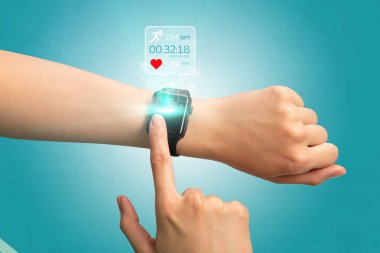The medical field has seen a tremendous transformation in recent decades in areas of science and technology. People are now becoming involved in monitoring their health without going to the hospital for spot medical checkup and monitoring.
Monitoring of health has been rapidly improved with the invention of wearable health monitoring devices. These are electronic devices designed to collect the personal health and exercise data of a consumer. These devices are also programmed to send the collected data to a doctor in real-time, especially in emergency cases. Some of the commonly measured data that a wearable health device displays include vital signs such as heart rate, body temperature, as well as blood oxygen saturation, blood pressure, physical activities, and posture.
Example of wearable health device fitness trackers which come in the shape of wristbands. They are equipped with sensors that record the user’s physical activity and heart rate. The device also recommends health and fitness tips to the wearer by syncing with different smartphone apps.
Another popular wearable device is the smart health watches that keep track of a user’s heart rhythm and at the same time allows users to perform their normal phone tasks, including reading notifications, making phone calls and texting. The wearable device also offers similar services as a wearable fitness tracker as it helps track fitness and offer fitness tips.
The invention and use of these wearable devices were necessitated due to the growing demands of health users to keep track and monitor their own vital to improve their health and wellness. As a result of the increased demand for these wearable health devices, it has created a huge market as more health consumers are beginning to wear them to monitor their health.
These wearable health devices offer many advantages and benefits to health users who use them in keeping track of their health data. The following are some of the benefits and advantages.
1. Helps in motivating people to look after their health.
People often miss signs when they have problems with their health which these wearable devices help to correct. Using any of these devices helps users improve their health by being motivated to track their vital signs and look out for complications.
2. It provides incentives for fitness
Wearable fitness trackers help to provide incentives to a user for self-improvement. The fitness trackers update users about their progress and show them where they need to improve.
3. Aids in proper diagnosis and treatment
Making a proper diagnosis is one of the benefits these wearable devices offer. The data collected by these devices enable both the users and the doctors to have a proper look at their health and make proper diagnosis and treatment when health problems arise.

4. Easy collection and access to data
These wearable health devices make it easy for data to be collected and access by both the users and their doctors. The health information collected is stored in the device and can be accessed at any time.
5. Affordable and cost-effective
Most of the wearable health devices that are available on the market are affordable and easy to use. It also cut down on the time and cost of going to hospitals for the same purpose.
6. Enables easier sharing of data
Another benefit of wearable technology in healthcare is that is enables easier sharing of health data between patients and physicians throughout the patient care ecosystem.
7. Early detection of health risks
Wearable technology can also help in improving early detection of disease or risk of a major health condition. Most wearable devices display an instant notification when biometric readings move to a risk zone.
Bottom Line
The functionality of wearable health devices and their ability to measure and capture vast amounts of patient data can benefit both doctors and patients. These benefits of wearable health devices have proven just so.








